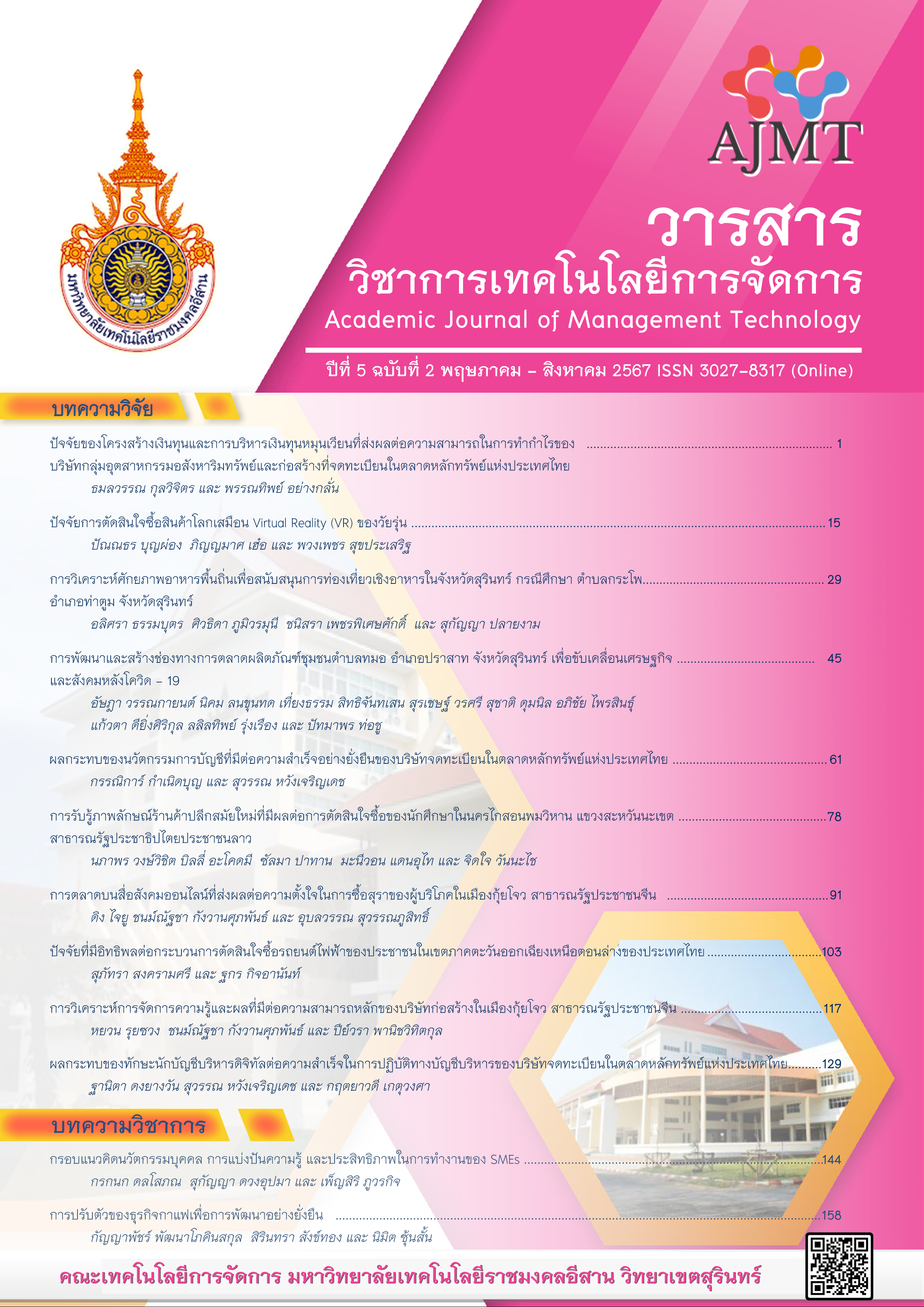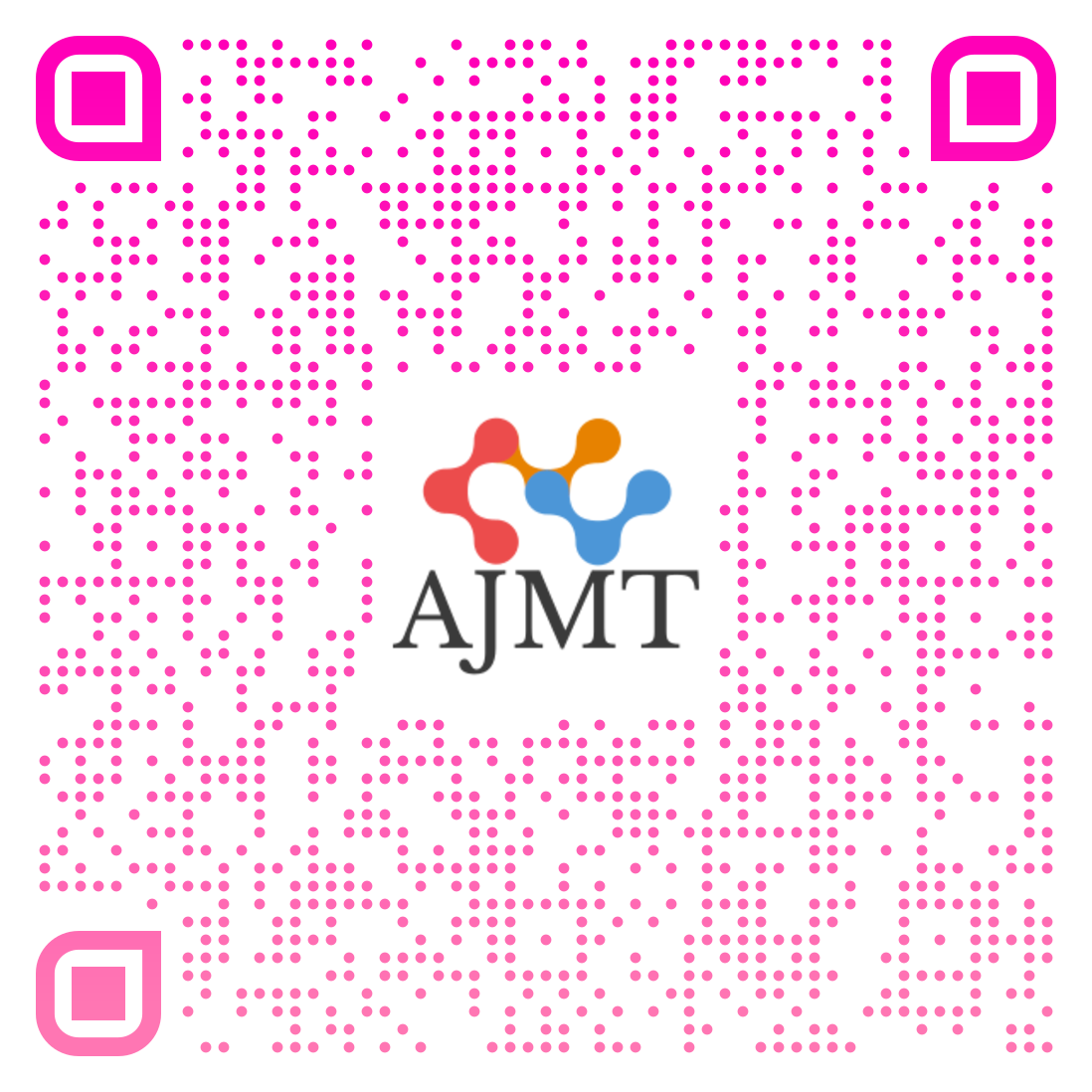การวิเคราะห์การจัดการความรู้และผลที่มีต่อความสามารถหลักของบริษัทก่อสร้างในเมืองกุ้ยโจว สาธารณรัฐประชาชนจีน
DOI:
https://doi.org/10.14456/ajmt.2024.18คำสำคัญ:
การจัดการความรู้, ความสามารถหลัก, ความสามารถทางการตลาด, ความสามารถทางเทคโนโลยีบทคัดย่อ
การวิจัยนี้มีวัตถุประสงค์เพื่อ 1) เพื่อศึกษาระดับระดับการจัดการความรู้ของบริษัทก่อสร้างของจีน ในเมืองกุ้ยโจว สาธารณรัฐประชาชนจีน 2) เพื่อศึกษาระดับความสามารถหลักของบริษัทก่อสร้างของจีนในเมืองกุ้ยโจว สาธารณรัฐประชาชนจีน และ 3) เพื่อศึกษาผลของการจัดการความรู้ที่มีต่อความสามารถหลักของบริษัทก่อสร้างของจีนในเมืองกุ้ยโจว สาธารณรัฐประชาชนจีน การวิจัยนี้เป็นการวิจัยเชิงปริมาณเก็บข้อมูลด้วยแบบสอบถาม โดยประชากรในการวิจัย ได้แก่ พนักงานที่ปฏิบัติงานในบริษัทก่อสร้างซึ่งดำเนินธุรกิจในเมืองกุ้ยหยาง ประเทศสาธารณรัฐจีน กลุ่มตัวอย่างจำนวน 352 คน ผู้วิจัยใช้แบบสอบถามเป็นเครื่องมือในการเก็บข้อมูลโดยรวบรวมแบบสอบถามจากกลุ่มตัวอย่าง ข้อมูลที่ได้นำมาวิเคราะห์และประมวลผลข้อมูลโดยใช้โปรแกรมสำเร็จรูปทางสถิติ เพื่อการวิจัย โดยกำหนดระดับความมีนัยสำคัญ 0.05 สถิติที่ใช้ในการวิเคราะห์ข้อมูล ได้แก่ ค่าความถี่ ค่าร้อยละ ค่าเฉลี่ย และค่าเบี่ยงเบนมาตรฐาน วิเคราะห์สมการถดถอยพหุคูณ สำหรับค่านัยสำคัญทางสถิติที่ใช้ในการวิเคราะห์กำหนดไว้ที่ระดับ 0.05 ผลการวิจัยพบว่า การจัดการความรู้ของบริษัทก่อสร้างซึ่งประกอบด้วยการได้มาซึ่งความรู้ การจัดเก็บความรู้ การใช้ความรู้ และการแลกเปลี่ยนความรู้ โดยรวมอยู่ในระดับมาก ความสามารถหลักของบริษัทโดยรวมอยู่ในระดับมาก ทั้งนี้ การจัดการความรู้ส่งผลต่อความสามารถหลักของบริษัททั้งความสามารถทางการตลาดและความสามารถทางเทคโนโลยี ที่ร้อยละ 50.10 อย่างมีนัยสำคัญทางสถิติที่ระดับ 0.05 ผลการวิจัยครั้งนี้ สามารถนำไปเป็นแนวทางในการการจัดการความรู้เพื่อให้สามารถส่งผลต่อการพัฒนาความสามารถหลักของบริษัท ในภาคธุรกิจก่อสร้างได้ต่อไป
เอกสารอ้างอิง
Abbasi, S. G., Shabbir, M. S., Alaghbari, M. A., & Abbas, M. (2020). Organizational culture and knowledgeSharing behavior: Moderated mediation model. Utopia y Praxis Latino Americana, 25, 480-490.
Afuah, A. (2002). Mapping technological capabilities into product markets and competitive advantage: The case of cholesterol drugs. Strategic Management Journal, 23, 171-179.
Alavi, M., & Leidner, D. E. (2001). Review: Knowledge management and knowledge management systems: Conceptual foundations and research issues. MIS Quarterly, 25(1), 107-136.
Aquilani, B., Abbate, T., & Codini, A. (2017). Overcoming cultural barriers in open innovation processes Through intermediaries: A theoretical framework. Knowledge Management Research and Practice, 15(3), 447–459.
Bashir, M., & Farooq, R. (2019). The synergetic effect of knowledge management and business model innovation on firm competence: A systematic review. International Journal of Innovation Science, 11(3), 362-387.
Bell, M., & Pavitt, K. (1995). The development of technological capabilities. Trade, Technology and International Competitiveness, 22(4831), 69-101.
Drucker, P. F. (1999). Knowledge-worker productivity: The biggest challenge. California Management Review, 41(2), 79-94.
Fellnhofer, K. (2017). Drivers of innovation success in sustainable businesses. Journal of Cleaner Production, 167, 1534-1545.
Fitch Rating. (2023). Outlook report: China engineering and construction outlook 2024.https://www.fitchratings com/research/corporate-finance/china-engineering-construction-outlook-2024-16-11-2023
Futu. (2024). 11 Maotai projects became Guizhou’s list of major provincial projects in 2024. https://shorturl.at/BEFG9
Dworman, G. O., Kimbrough, S. O., Kirk, S. E. & Oliver, J. R.. (1997). On relevance and two aspects of the organizational memory problem, Journal of Management Information Systems, 0-31.
Gold, A. H., Malhotra, A., & Segars, A. H. (2001). Knowledge management: An organizational capabilities perspective. Journal of Management Information Systems, 18(1), 185-214.
Grant, R. M. (1996). Toward knowledge- based theory of the firm. Strategic Management Journal, 17(Special Issue), 109–122.
Hamdoun, M., Jabbour, C. J. C., & Othman, H. B. (2018). Knowledge transfer and organizational innovation:Impacts of quality and environmental management. Journal of Cleaner Production, 193, 759-770.
Hobday, M., Davies, A., & Prencipe, A. (2005). Systems integration: A core capability of the modern corporation. Industrial and Corporate Change, 14(6), 1109-1143.
Hughes, P., & Hodgkinson, I. (2021). Knowledge management activities and strategic planning capability development. European Business Review, 33(2), 238-254.
Ibarra, D., Bigdeli, A. Z., Igartua, J. I., & Ganzarain, J. (2020). Business model innovation in established SMEs:
A configurational approach. Journal of Open Innovation: Technology, Market, and Complexity, 6(3), 76.
Jaworska, M. (2023). The classification of the capabilities of the firm. Zeszyty Naukowe Politechniki Śląskiej. Organizacja i Zarządzanie, 169, 370-382.
Kamasak, R., & Bulutlar, F. (2010), The influence of knowledge sharing on innovation. European Business Review, 22(3), 306-317.
Kankanhalli, A., Tan, B., & Wei, K. K. (2005). Contributing knowledge to electronic knowledge repositories: An empirical investigation. MIS Quarterly, 29, 113–143.
Kordab, M., Raudeliūnienė, J., & Meidutė-Kavaliauskienė, I. (2020). Mediating role of knowledge management in the relationship between organizational learning and sustainable organizational performance. Sustainability, 12(23), 10061.
Lam, L., Nguyen, P., Le, N., & Tran, K. (2021). The relation among organizational culture, knowledge management, and innovation capability: Its implication for open innovation. Journal of Open Innovation: Technology, Market, and Complexity, 7(1), 66.
Liao, S., Fu, L., & Liu, Z. (2020). Investigating open innovation strategies and firm performance: The moderating role of technological capability and market information management capability. Journal of Business & Industrial Marketing, 35(1), 23-39.
Mahdi, O. R., Nassar, I. A., & Almsafir, M. K. (2019). Knowledge management processes and sustainable competitive advantage: An empirical examination in private universities. Journal of Business Research, 94, 320-334.
Martin, S. L., Javalgi, R. R. G., & Ciravegna, L. (2020). Marketing capabilities and international new venture performance: The mediation role of marketing communication and the moderation effect of technological turbulence. Journal of Business Research, 107, 25-37.
Martins, V. W. B., Rampasso, I. S., Anholon, R., Quelhas, O. L. G., & Leal Filho, W. (2019).Knowledge management in the context of sustainability: Literature review and opportunities for future research. Journal of Cleaner Production, 229, 489-500.
Mehta, N., & Bharadwaj, A. (2015). Knowledge integration in outsourced software development: The role of sentry and guard processes. Journal of Management Information Systems, 32(1), 82-115.
Mertins, I. K., Heisig, D. S. P., & Vorbeck, D. P. J. (2013). Knowledge management: Best practices in Europe. Springer Science & Business Media.
Momeni, M., Monavarian, A., Shaabani, E., & Ghasemi, R. (2011). A conceptual model for knowledge management process capabilities and core competencies by SEM the case of Iranian automotive industry. European Journal of Social Sciences, 22(4), 473-489.
Nonaka, I., von Krogh, G., & Voelpel, S. (2006). Organizational knowledge acquisition theory: Evolutionary paths and future advances. Organization Studies, 27(8), 1179-1208.
Ouakouak, M. L., Ouedraogo, N., & Mbengue, A. (2014). The mediating role of organizational capabilities in the relationship between middle managers’ involvement and firm performance: A European study. European Management Journal, 32(2), 305-318.
Peng, M. W., Wang, D. Y. L., & Jiang, Y. (2008). An institution-based view of international business strategy: A focus on emerging economies. Journal of International Business Studies, 39(5), 920-936.
Pimentel, J. L. (2010). A note on the usage of Likert Scaling for research data analysis. USM R&D Journal, 18(2), 109-112.
Prahalad, C. K., & Hamel, G. (1990). The core competencies of the corporation. Harvard Business Review, 68, 79-91.
Raudeliūnienė, J., & Kordab, M. (2019). Impact of knowledge oriented leadership on knowledge management processes in the Middle Eastern audit and consulting companies. Business, Management and Economics Engineering, 17(2), 248-268.
Reichert, F. M., & Zawislak, P. A. (2014). Technological capability and firm performance. Journal of Technology Management & Innovation, 9(4), 20-35.
Sadeghi, A., & Rad, F. M. (2018). The role of knowledge-oriented leadership in knowledge management and innovation. Management Science Letters, 8, 151-160.
Shariq, S. M., Mukhtar, U., & Anwar, S. (2019). Mediating and moderating the effect of goal orientation and emotional intelligence on the relationship between knowledge oriented leadership and knowledge sharing. Journal of Knowledge Management, 23(2), 332–350.
Sirkemaa S. J. (2019). Key perspectives in information technology infrastructure management. Journal of Advances in Information Technology, 10(3), 100-103.
Small, C. T., & Sage, A. P. (2006). Knowledge management and knowledge sharing: A review. Information Knowledge Systems Management, 5(3), 153-169.
Song, M., Droge, C., Hanvanich, S., & Calantone, R. (2005). Marketing and technology resource complementarity: An analysis of their interaction effect in two environmental contexts. Strategic
Management Journal, 26, 259-276.
Spanos, Y., E., & Lioukas, S. (2001). An examination into the causal logic of rent generation: Contrasting Porter’s competitive strategy framework and the resource-based perspective. Strategic Management Journal, 22, 907-934.
Su, Y. S., Tsang, E. W., & Peng, M. W. (2009) How do internal capabilities and external partnerships affect innovativeness? Asia Pacific Journal of Management, 26(2), 309-331.
Sumbal, M. S., Tsui, E., See-to, E., & Barendrecht, A. (2017). Knowledge retention and aging workforce in the oil and gas industry: A multi perspective study. Journal of Knowledge Management, 21(4), 907-924.
Teece, D. J. (2006). Reflections on profiting from innovation. Research Policy, 35(8), 1131-1146.
Teece, D. J. (2018). Business models and dynamic capabilities. Long Range Planning, 51(1), 40-49.
Teerathanachaiyakun, K. & Shounchupol, A. (2023). Factors influencing the competitive advantage of small and medium enterprises in the wholesale-retail sales sector of Thailand. Academic Journal of Management Technology, 4(2 July-December), 213-223.
The Guiyang Municipal People’s Government. (2022). Guizhou boosts construction on industrial projects. http://gxj.english.guiyang.gov.cn/2022-07/11/c_787901.htm
Tubigi, M., & Alshawi, S. (2015). The impact of knowledge management processes on organizational performance: The case of the airline industry. Journal of Enterprise Information Management, 28(2), 167-185.
Vorhies, D. W., & Morgan, N. A. (2005) Benchmarking marketing capabilities for sustainable competitive advantage. Journal of Marketing, 69(1), 80-94.
Walsh, J. P., & Ungson, G. R. (1991). Organizational memory. Academy of Management Review, 16, 57-91.
Yee-Loong Chong, A., Ooi, K. B., Bao, H., & Lin, B. (2014). Can e-business adoption be influenced by knowledge management? An empirical analysis of Malaysian SMEs. Journal of Knowledge Management, 18(1), 121-136.
Yin, X., & Zajac, E. J. (2004) The strategy/governance structure fit relationship: Theory and evidence in franchising arrangements. Strategic Management Journal, 25(4), 365-383.
Zack, M. H. (1999). Managing codified knowledge. Sloan Management Review, 40, 45–58.
Zaim, H., Muhammed, S., & Tarim, M. (2019). Relationship between knowledge management processes and performance: Critical role of knowledge utilization in organizations. Knowledge Management Research & Practice, 17(1), 24-38.
ดาวน์โหลด
เผยแพร่แล้ว
รูปแบบการอ้างอิง
ฉบับ
ประเภทบทความ
สัญญาอนุญาต
ลิขสิทธิ์ (c) 2024 คณะเทคโนโลยีการจัดการ มหาวิทยาลัยเทคโนโลยีราชมงคลอีสาน วิทยาเขตสุรินทร์

อนุญาตภายใต้เงื่อนไข Creative Commons Attribution-NonCommercial-NoDerivatives 4.0 International License.
บทความที่ได้รับการตีพิมพ์เป็นลิขสิทธิ์ของคณะเทคโนโลยีการจัดการ มหาวิทยาลัยเทคโนโลยีราชมงคลอีสาน วิทยาเขตสุรินทร์
ข้อความที่ปรากฏในบทความแต่ละเรื่องในวารสารวิชาการเล่มนี้ เป็นความคิดเห็นส่วนตัวของผู้เขียนแต่ละท่านไม่เกี่ยวข้องกับคณะเทคโนโลยีการจัดการ มหาวิทยาลัยเทคโนโลยีราชมงคลอีสาน วิทยาเขตสุรินทร์ และคณาจารย์ท่านอื่นๆในมหาวิทยาลัยฯ แต่อย่างใด ความรับผิดชอบองค์ประกอบทั้งหมดของบทความแต่ละเรื่องเป็นของผู้เขียนแต่ละท่าน หากมีความผิดพลาดใดๆ ผู้เขียนแต่ละท่านจะรับผิดชอบบทความของตนเองแต่ผู้เดียว










